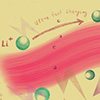| Oct 31, 2022 |
|
(Nanowerk Information) As the electrical automobile (EV) trade is advancing, so are the efforts within the analysis and improvement of superior lithium (Li)-ion batteries to energy these autos. Exploring and increasing speedy charge-discharge expertise and prolonged battery life are important challenges of their improvement. A couple of components, such because the diffusion of Li ions, traits of the electrode-electrolyte interface, and electrode porosity, may help overcome these points obtain excessive quick charging and ultralong life.
|
|
Lately, two-dimensional (2D) nanomaterials, that are skinny sheet-like buildings with a thickness of some nanometers, have emerged as potential anode supplies for Li-ion batteries. These nanosheets possess a excessive facet ratio and excessive density of lively websites, which permits quick charging and superior biking efficiency.
|
|
Particularly, 2D nanomaterials primarily based on transition-metal diborides (or TMDs) have piqued the curiosity of researchers. TMDs have been discovered to have a excessive fee and lengthy biking stability for Li ion storage, owing to their honeycomb planes of boron and multivalent transition-metal atoms.
|
|
Lately, a bunch of scientists led by Prof. Noriyoshi Matsumi from the Japan Superior Institute of Science and Know-how (JAIST) and Prof. Kabeer Jasuja from the Indian Institite of Know-how (IIT) Gandhinagar got down to additional discover the potential of TMDs for vitality storage. The staff performed the primary experimental research on the storage potential of titanium diboride (TiB2)-based hierarchical nanosheets (THNS) as an anode materials for Li-ion batteries. The staff comprised Rajashekar Badam, former Senior Lecturer at JAIST; Akash Varma, former M.S. Course Pupil at JAIST; Koichi Higashimine, Technical Specialist at JAIST and Asha Liza James, Ph.D. Pupil at IIT Gandhinagar.
|
|
Their research was printed in ACS Utilized Nano Supplies (“Titanium Diboride-Based mostly Hierarchical Nanosheets as Anode Materials for Li-Ion Batteries”).
|
 |
| Researchers demonstrated the effectivity of titanium diboride-based nanosheets (THNS) as anode materials in Li-ion batteries. These batteries maintain excessive present densities which allow ultra-fast charging and excessive retention capability delivering superior biking efficiency. (Picture: Kabeer Jasuja)
|
|
The THNS had been developed by oxidizing TiB2 powder with hydrogen peroxide, adopted by centrifuging and freeze-drying the answer. “What makes our work stand out is the scalability of the tactic developed for synthesizing these TiB2 nanosheets. For any nanomaterial to translate right into a tangible expertise, scalability is the limiting issue. Our synthesis methodology solely requires stirring and no subtle gear. That is on account of the dissolution and recrystallization habits exhibited by TiB2, a serendipitous discovery that makes this work a promising bridge from lab to the sector,” explains Prof. Kabeer.
|
|
Thereafter, the staff constructed an anodic Li-ion half-cell utilizing the THNS as lively anode materials. The staff studied the charge-storage traits of the THNS-based anodes.
|
|
The staff discovered that the THNS-based anode confirmed a excessive discharge capability of 380 mAh/g with a present density of simply 0.025 A/g. Moreover, they noticed {that a} discharge capability of 174 mAh/g could possibly be obtained for a excessive present density of 1 A/g, with a cost time of 10 min and a capability retention of 89.7% after 1,000 cycles. Moreover, the THNS-based Li-ion anode may maintain very excessive present charges, within the order of 15 to twenty A/g facilitating ultrafast charging in about 9 to 14 seconds. Underneath the excessive present fee, with a capability retention larger than 80% was noticed after 10,000 cycles.
|
|
The outcomes of this research point out the suitability of the 2D TiB2 nanosheets as a candidate for fast-charging and long-life Li-ion batteries. In addition they spotlight the benefit of nano-scaling bulk supplies, like TiB2, to achieve promising properties, together with pseudocapacitive cost storage, glorious high-rate functionality, and superior cyclability.
|
|
Explaining the potential long-term results of their analysis, Prof. Matsumi says, “Such quick-charging expertise can speed up the diffusion of EVs and considerably lower ready occasions for charging varied cell digital gadgets. We hope our findings can stimulate extra analysis on this discipline, which may finally result in the comfort of EV customers, lesser air air pollution in cities, and fewer irritating cell life as a way to improve the productiveness of our society.”
|


